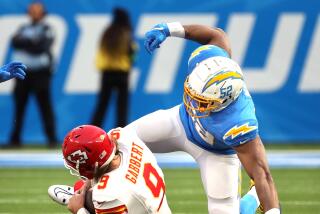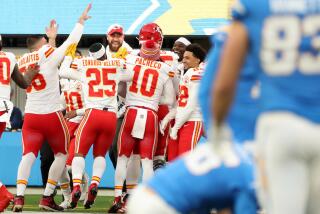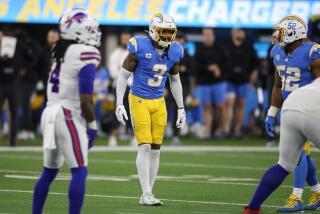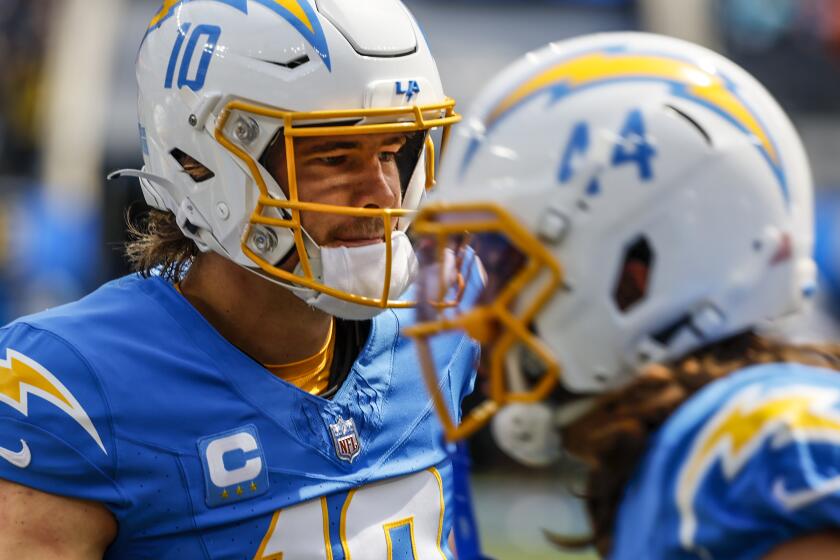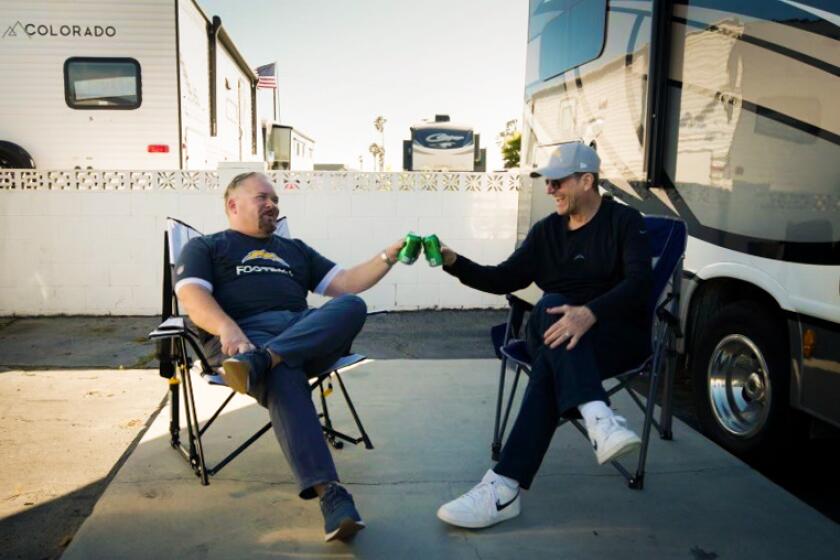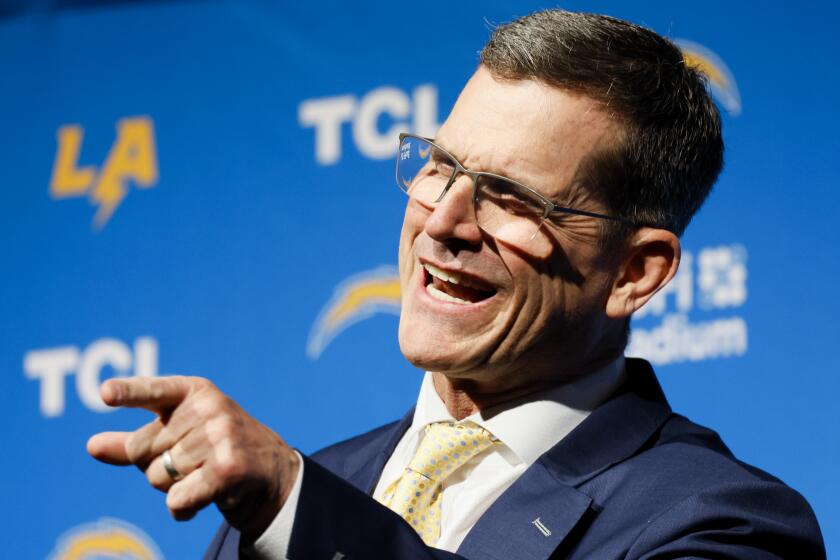Chargers look to lock down victories after coming apart at the end of games
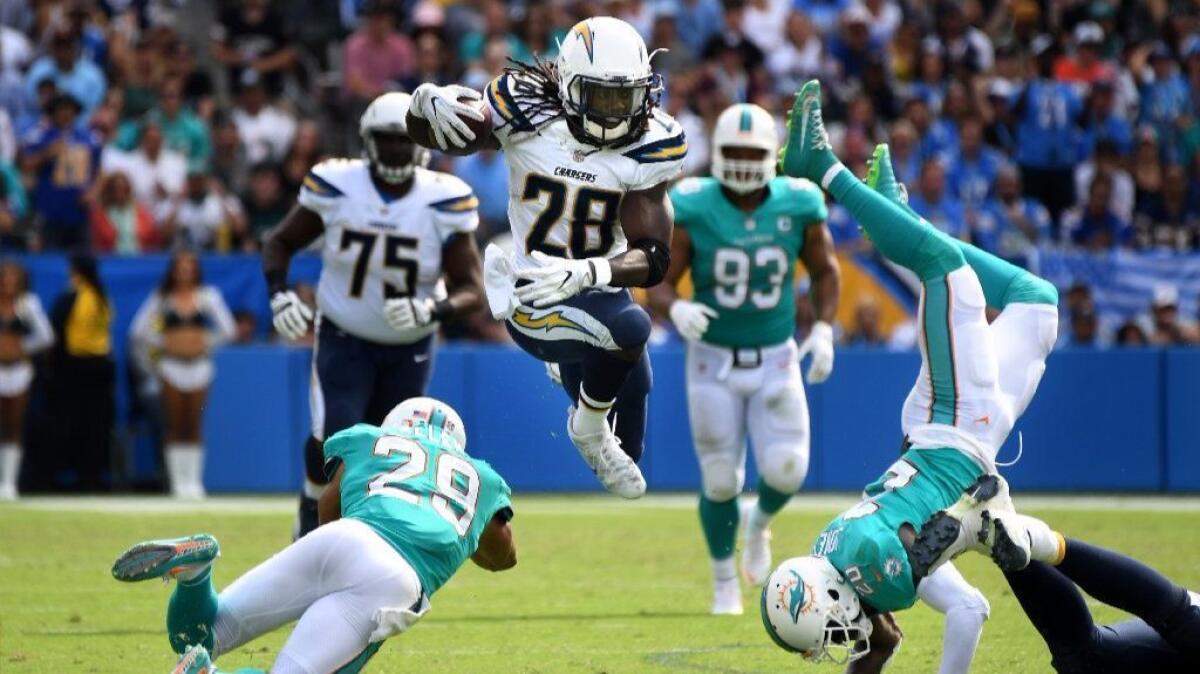
On the drive to and from the Chargers’ practice facility, there’s a big blue reminder of their situation through the first two weeks of the season.
The team’s new home in Costa Mesa sits across the street from IKEA — the Swedish meatball and furniture chain that demands its customers stay organized to the end of a project.
It’s there, after all, that a dresser comes in a flat box, tons of assembly required. If you follow all the steps but are left with a slab of wood, a few screws and a couple washers — well, you don’t have a dresser.
In two games, the Chargers have had the instructions for a victory and they’ve seemingly been equipped with the parts. But when the clock has wound down, they’ve been there with key pieces still in their hands — and well, they don’t have a win.
Being close to completing the job against Denver and the Dolphins has had an effect on the team.
“There have been things here and there — in the Denver game and in the Miami game — where you watch it and it just makes you sick,” Chargers center Spencer Pulley said. “It’s that close. It’s not even one man — it’s like half a man. “
The Chargers are winless because of a matter of fractions — a block here, a step there, a few yards to the left. They were a field goal away of going to overtime in Denver, momentum in hand. They were a kick from orchestrating a game-winning drive against the Dolphins.
“After watching this game, first of all there were a lot of plays that could have made a difference in this game. It wasn’t just the missed field goals that everyone seemed to be focusing on,” Chargers coach Anthony Lynn said. “Just evaluating this tape, on offense, defense and special teams there’s certainly plays where we could have done better.”
The “better” extends to Lynn, as well.
Against Denver, Lynn challenged a play that was clearly an incompletion, costing the team a timeout. In Week 2, Lynn, offensive coordinator Ken Whisenhunt and special teams coordinator George Stewart were crossed up as to how to handle the final moments.
The offense moved the ball to the middle of the field, where it had planned to spike the ball to stop the clock. However, the Chargers kicker and holder ran onto the field in a temporary moment of chaos with the clock running down.
For some reason, Miami called timeout, allowing the Chargers to regroup.
“We were going to center the ball and clock it. Everyone has a headset on except my special teams coordinator,” Lynn said. “I’ve got to do a better job communicating with him. And that’s all that was.”
In a way, things ended up OK — the clock stopped, the Chargers got the kick off. But did the confusion cause a problem? Did it make things percentage points tougher on Younghoe Koo, who pushed the game-winner just to the right?
Against worse teams in easier situations, those decimals might not matter. Playing in the AFC West, it’s the difference between first and last place.
“It’s probably more for the pundits to argue over as far as divisions, but this is about as good as it gets,” Kansas City quarterback Alex Smith said Tuesday.
The Broncos, Raiders and Chiefs have been three of the league’s most impressive teams through two weeks, and it seems like the division could conceivably end up sending three teams to the postseason.
Right now, the Chargers are on the outside. All hope, though, isn’t lost.
A season ago, Miami started 0-2 before rallying to make the playoffs. In 2015, Seattle and Houston both made the postseason after losing their first two games.
“We could play the same games and have just a couple of different plays, and we’d all be happy. We’d be 2-0. That’s just not the way it went down,” Pulley said. “We know how good of a team we are and how good we can be if we just continue down this path and fix these little things.”
Bad teams can’t figure out ways to fix the small problems without causing issues elsewhere. They let the little things become bigger and bigger problems. Good teams? They take all the pieces and figure out ways to put it all together.
“We’re going to find out what the character, what the identity of this team is,” Chargers left tackle Russell Okung said. “We’ll see that really soon.”
Follow Dan Woike on Twitter @DanWoikeSports
More to Read
Go beyond the scoreboard
Get the latest on L.A.'s teams in the daily Sports Report newsletter.
You may occasionally receive promotional content from the Los Angeles Times.

